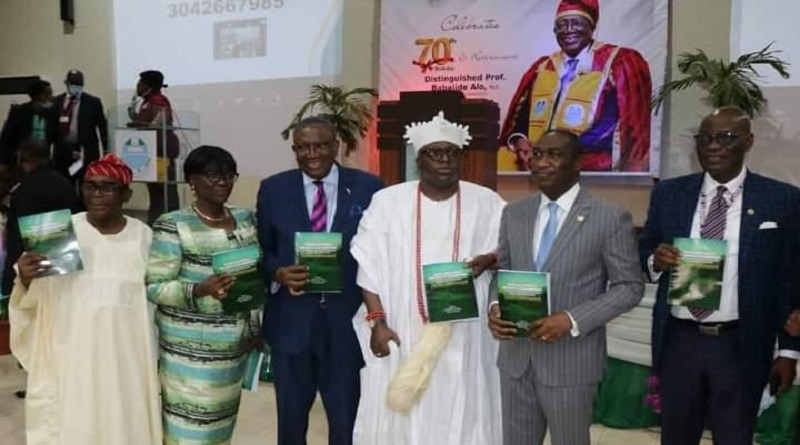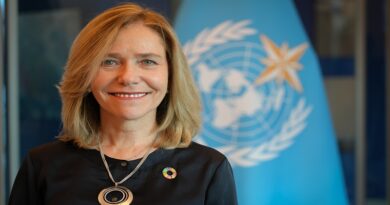Hamzat calls for population control to limit threat of climate change
Photo caption: (L-R) Chief Launcher, Chief Agboola Odeyemi; Permanent Secretary, Ministry of the Environment, Mrs. Belinda Odeneye; the celebrant, Prof Babajide Ibitayo Alo; Oniru of Iru Kingdom, HRM, Oba Omogbolahan Lawal; Lagos Deputy Governor, Dr. Kadri Obafemi Hamzat and Vice-Chancellor UNILAG, Prof. Oluwatoyin Ogundipe, during the Unveiling of the Compendium on Prof. Babajide Alo held on Tuesday 6th October 2021 at the UNILAG, Campus, Akoka.
With the rapidly growing population and challenging economic situations in the country, Lagos State Deputy Governor, Dr. Kadri Obafemi Hamzat, has stressed the need for the nation to control its population to limit the threat of climate change and protect the environment.
Speaking on Tuesday 6th October 2021 at a lecture to celebrate the 70th birthday and retirement ceremony of the distinguished Professor Babajide Ibitayo Alo, Dr. Hamzat stated that the nation needs to effectively manage its population, especially as many fathers cannot meet up with the challenge of raising their children.
Noting that there is a widespread lack of parental responsibilities, the Deputy Governor compared the population growth of Nigeria with that of the United Kingdom, stressing that Nigeria’s population has increased significantly from 67 million to over 200 million within 61 years.
In his paper presentation titled: “The Role and Perspective of Government in Resolving Current Issues on Global Environmental Challenges”, Dr. Hamzat, described climate change as a threat to humanity, which needs to be curbed through deliberate and immediate action.
He added that Lagos State, in the last 10 to 14 years, has taken climate change issues seriously by putting together numerous policy frameworks and adopting global best practices to shape the government’s response to climate change challenges.
According to him, “We are aware that as a highly vulnerable coastal State with a rapidly growing population, we must fast to protect its fragile ecosystems and population in low-lying areas. Guided by the climate change scenarios and the target of achieving net-zero carbon emission by 2050, we identified a series of climate action plans in the water, transport and energy sectors respectively.
He narrated efforts made by the present administration in the transportation sector, stating that the government plans to expand the BRT network, deploy low-emission buses and vehicles for the BRT system up to the edge of the city. While, in the energy sector, deployment of decentralised renewable energy installations such as Solar PhotoVoltaic systems in schools, hospitals and municipal buildings.
In his remarks, the Oniru of Iru Land, Oba Abdulwasiu Omogbolahan Lawal, called for the cooperation of the people in the protection of the environment, saying government relies on the citizens’ support to protect the environment and achieve the desired results.
He stated that the Lagos State Government is striving to build a more sustainable city that will be resilient to the effect of climate change, pointing out the efforts of the government to reduce carbon footprint by adopting a compact city plan and establishing six air quality monitoring stations.
Also speaking, the celebrant, Prof. Babajide Ibitayo Alo, urged the government to deepen the domestication of relevant training, research and development and improve local content drive in all sectors of the economy.
He said: “This is a very desirable need for strengthening the multi-disciplinary research in our universities and research institutions for competence, excellence in the university’s research, innovation efforts and achieving access to more international grants”.



